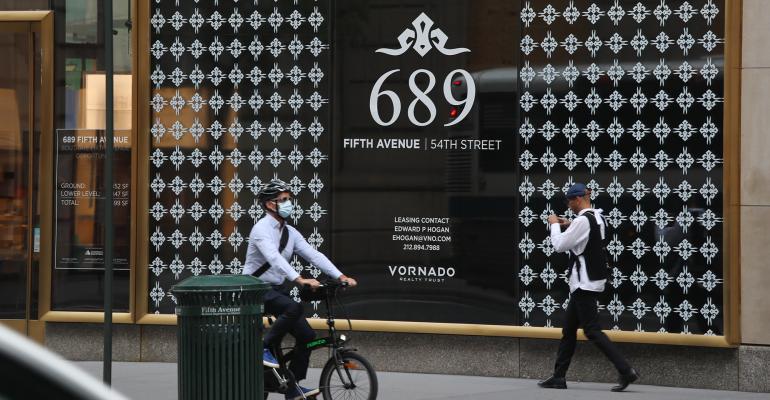(Bloomberg)—Not long ago, major fashion brands were willing to pay ballooning rents just to have a store on Manhattan’s Fifth Avenue. Now the world-famous shopping strip has transformed into a battleground between landlords and tenants seeking a way out of pricey leases.
It’s a side effect of the pandemic that’s plagued New York for more than a year. The foreign tourists who were Fifth Avenue’s lifeblood before the lockdown are gone. So, for the most part, are the office workers who might have stopped at a store while hustling by. Boarded-up spaces and “For Rent” signs are multiplying.
The few merchants looking to sign new leases are demanding deep discounts. Some that have been there all along -- such as the National Basketball Association, Valentino and Marc Fisher -- are embroiled in legal battles with their landlords over unpaid rent.
Along a roughly 20-block stretch of Fifth Avenue, the handful of landlords involved in legal disputes are owed about $200 million. If those tenants walk away, it would mean more vacancies on a corridor that was starting to struggle even before the pandemic.
“The numbers are big,” said Tom Mullaney, a managing director at brokerage Jones Lang LaSalle Inc. “If some of the tenants are financially stressed and they lose, it’ll be very painful. Conversely, if some of the landlords are overleveraged and have cash flow issues, it can be traumatic for them too.”
Recovery Roadblocks
Since last March, struggling retailers across the U.S. have missed billions in rent payments, citing lost sales due to social-distancing rules and other pandemic restrictions. While many companies have reopened stores or worked out compromises with landlords, a few giant Fifth Avenue deals remain in gridlock, signaling further roadblocks to the street’s recovery.
There’s much at stake for New York City, where commercial real estate has taken a hit over the last year. Empty storefronts erode the street’s appeal for the eventual return of tourists, about two-thirds of whom vanished in 2020, according to NYC & Co., the city’s marketing organization. That’s given retailers that pay dearly for premium locations some tough choices.
The NBA has kept its three-story store at 545 Fifth Ave. shuttered, even as neighboring spaces gradually reopened. The basketball league has racked up more than $8 million in missed payments, according to Ed Klein, the attorney for landlord Moinian Group.
National Basketball Association, The NBA, at 545 Fifth Ave.Manhattan ,New York 30th March 2021,
Ten blocks north, Valentino decided to walk away from its four-level space at 693 Fifth Ave. and sought in court to be released from the roughly eight years remaining on its lease. A New York state judge ruled against its case, but the retailer has filed a notice for appeal. In turn, the Italian luxury label’s landlord filed a lawsuit seeking $207 million -- not just to cover lease payments, but also for damages to the shop’s Venetian terrazzo marble panels.
This month, the Trump Organization sued footwear maker Marc Fisher, a tenant at Trump Tower, for more than $1 million in missed rent dating back to November.
Representatives for Marc Fisher and the NBA didn’t respond to requests for comment. A Valentino representative declined to comment.
Prized Spot
The outcome of these dragged out disputes may have a lingering impact on Fifth Avenue. The corridor is typically a prized and pricey spot to locate a shop alongside the longtime homes of famed luxury department store Bergdorf Goodman, jeweler Tiffany & Co. and the Plaza Hotel. The economic fallout from the pandemic has made that arithmetic more complicated.
“They will likely never be what they’ve been before,” Simeon Siegel, an analyst at BMO Capital Markets, said of Fifth Avenue’s flagship stores. “But at the end of the day, they’re still one of the best ways to reach people -- if people are there.”
The reduced demand for space has forced landlords to cut prices. Ground-floor asking rents on Lower Fifth Avenue, from 42nd to 49th streets and dominated by national chains, fell 20% in the fourth quarter from a year earlier, data from Cushman & Wakefield show.
Luxury-leaning Upper Fifth Avenue, stretching to 60th Street, fared better. Rents there slipped 3.7% to $2,575 a square foot on average. For both areas, more than 23% of the retail space is available, according to the brokerage.
Retail Pain
More empty storefronts may appear on Fifth Avenue, with at least three leases set to expire soon.
Giorgio Armani’s agreement for its boutique and restaurant near 56th street is running out in two years and it’s unclear whether the Italian fashion label will renew it, according to a person familiar with the matter.
Across the intersection, Abercrombie & Fitch’s short-term extension will end early next year and executives say they haven’t yet decided on its future. Just around the corner, Tiffany plans to leave its 74,000-square-foot (6,900-square-meter) temporary store by mid-2022.
Representatives for Tiffany, Abercrombie and Armani declined to comment.
There are some tenants who have signed new deals, lured by bargain rents. Spanish fast-fashion chain Mango secured a substantially discounted sublease from Ralph Lauren, according to people familiar with the matter. Across the street, luxury jeweler Harry Winston recently agreed to expand into a neighboring space at 712 Fifth Ave., the former Henri Bendel store.
A pedestrian wearing a protective mask walks past luxury jeweler Harry Winston at 712 Fifth Avenue.
JLL’s Mullaney is betting on the long-term revival of Fifth Avenue and other major U.S. shopping districts, but the short-term outlook is more grim.
“There’s way too many people trying to exit or sublease space, and not too many tenants that are interested,” he said. “And tenants that are interested are looking at rates that give landlords heart attacks. I don’t think its a good time to be a landlord right now.”
--With assistance from Alex Wittenberg.
© 2021 Bloomberg L.P.




